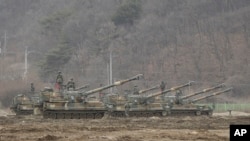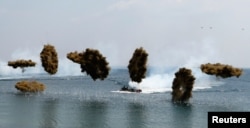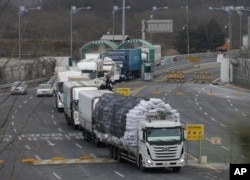North Korea has threatened a pre-emptive nuclear strike as U.S. and South Korean forces began their largest joint exercises ever conducted.
The annual joint drills often intensify tensions on the divided Korean peninsula, but this year the situation is particularly volatile, given tough new United Nations sanctions imposed on North Korea for its recent nuclear test and long-range rocket launch.
The Philippines has already acted to enforce the sanctions when it impounded a cargo vessel linked to North Korea.
This year’s joint exercises, known as Key Resolve and Foal Eagle, involve 17,000 American troops, four times more than participated last year, as well as 300,000 South Korean troops, and an array of U.S. aircraft and naval vessels, including the nuclear-powered submarine the USS North Carolina and the nuclear-powered aircraft carrier the USS John C. Stennis.
North Korea’s National Defense Commission Monday denounced the military exercises in a statement and said it was prepared for a "sacred war of justice for reunification.”
"As the joint military exercises to be staged by the enemies are regarded as the most undisguised nuclear war drills, aimed to infringe upon the sovereignty of [North Korea], its military counteraction will be more a preemptive and offensive nuclear strike to cope with them," the statement said.
US, South Korea react
The U.S. reacted to Pyongyang’s threat of a pre-emptive strike saying it takes all threats seriously and is closely monitoring the situation.
The annual joint military exercises between the U.S. and South Korea are “transparent” and “defense-oriented,” said a State Department official.
The official said in contrast to the situation involving the U.S. and South Korea, Pyongyang had not invited international monitors to observe its military drills and had “refuses” to engage with the Neutral National Supervisory Commission.
South Korean Defense Ministry spokesman Moon Sang-kyun called the North Korean pre-emptive strike threat “unacceptable.”
“If North Korea ignores our warnings and provokes, our military will firmly and mercilessly respond. We warn North Korea that it must be responsible for all situations which lead to its reckless provocations,” he said on Monday.
No hotline
North Korea’s recent nuclear test and rocket launch has triggered retaliatory responses that increase the potential for inter-Korean conflict.
The Seoul government closed the Kaesong Industrial Complex (KIC) that it jointly operated with Pyongyang.
North Korea then immediately deported all South Koreans who were working at the KIC and cut an emergency communication hotline put in place to defuse dangerous military situations.
With U.S. and South Korean forces on high alert and with no working communication hotline, any perceived North Korean provocation could easily escalate.
“If North Korea wants to take some kind of belligerent military action against the South and in some limited way, I think they are running a very high risk of facing some retaliation,” said Northeast Asia security analyst Daniel Pinkston with Troy University in Seoul.
Impounded cargo vessel
The Philippines has become the first country to enforce the new United Nations sanctions on North Korea.
The Philippine Coast Guard on Friday detained and searched the Jin Teng, a 4,355-ton cargo ship with a crew of 21 North Korean citizens.
The vessel was carrying agricultural byproducts often used as livestock feed.
The search revealed no illicit cargo related to North Korea’s banned arms trade or nuclear program, only minor safety violations.
However, the Jin Teng has been sanctioned by the U.N. as one of 31 vessels owned by Pyongyang-based Ocean Maritime Management Co. (OMM) for past involvement in trading arms.
In 2014, the OMM was banned by the U.N. when one of its ships was caught transporting jet fighters and other weapons from Cuba during an inspection in Panama.
Philippine authorities impounded the vessel, are planning to deport the crew and have called in the United Nations to coordinate further actions to be taken.
Manuel L. Quezon III, a member of President Benigno Aquino’s communications team, told a government-run radio station Saturday that “as a member of the U.N., the Philippines has to do its part to enforce the sanctions.”
VOA's Pam Dockins at the State Department and Youmi Kim in Seoul contributed to this report.
















